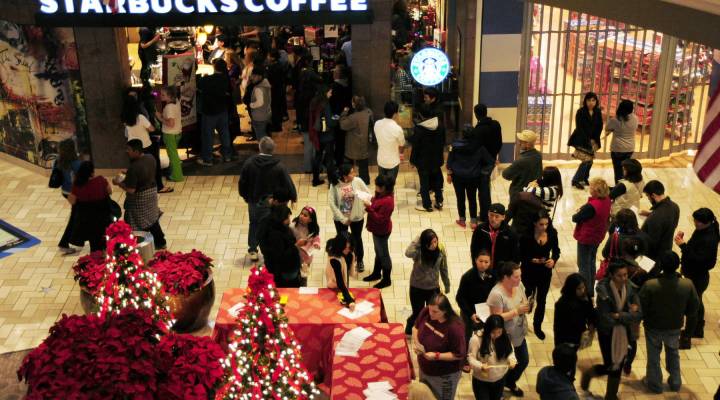
Holiday drinks: A mix of science and clever marketing
Holiday drinks: A mix of science and clever marketing

Starbucks has released its first new seasonal beverage in five years – the chestnut praline latte.
Formulating the drink took two years of research and development, says Starbucks spokeswoman Linda Mills.
The flavor was the one customers liked best during taste-testing. While it does not feature chestnuts, the drink does contain smoky chestnut flavoring. That, along with caffeine, sugar and fat, make for a holiday mix that packs a whole lot of nostalgia.
“It really is reminiscent of, you know, chestnuts roasting on an open fire,” Mills says.
Cue the music.
“Food marketing people are trying to take advantage of those warm fuzzy feelings, and they have been very successful,” says MaryAnne Drake, a food scientist at North Carolina State University.
It’s not just clever marketing. There’s some science behind our attraction to these flavors.
The secret, says Drake, is in the scent.
The aromas in these holiday products are crafted to trigger emotions and feelings, she says. In the last five years, scientists have made huge steps in understanding how scents affect us neurologically. And the feelings aroused aren’t always warm, fuzzy ones.
“There was a study,” Drake says, “where they actually – forgive me for being indelicate – hooked up men and their private parts and then had them smell particular things to see which evoked the best response from their private parts. And pumpkin pie spice had a really strong response.”
Pumpkin kicked off this modern holiday flavor craze about a decade ago, Drake says. Starbucks, for example, has sold over 200 million pumpkin spice lattes since releasing the drink in 2003.
And then there’s Trader Joe’s. Come October, the stores offer products like pumpkin ice cream, pumpkin ale, pumpkin rooibos tea, pumpkin cereal, and even salad with pumpkin seeds, pumpkin croutons and pumpkin vinaigrette. At a San Francisco store, a shelf stocker said that at one point the store featured 67 items with pumpkin flavor. Halloween, he says, has really just become pumpkin season.
Pumpkin is pretty much over now that it’s late November. Companies are signaling the coming of winter with a whole new series of flavors. Market analyst Robert Eckard says some of the big ones this year are salted caramel, pecan pie, peppermint patty, sugar cookie and dark chocolate cognac. There are also some more surprising flavor trends this year, like mescal and smoke.
Companies have been playing with seasonal flavors for decades, Eckard says, but now chain corporations can afford to hire specialized flavorists who concoct powerful and addictive tastes. Flavoring has grown into a $2.7 billion industry, and seasonal drinks are a big part of it.
Eckard likes to call them “liquid deserts, or holiday in a glass.”
While corporations can giveth, they can also taketh away. Starbucks was going to stop serving its eggnog latte at certain locations this year but rethought the move after the company was flooded with letters. Customers complained that Christmas just wouldn’t be Christmas without it.
So we have a new tradition: the commercially-developed, scientifically flavored, holiday beverage.
There’s a lot happening in the world. Through it all, Marketplace is here for you.
You rely on Marketplace to break down the world’s events and tell you how it affects you in a fact-based, approachable way. We rely on your financial support to keep making that possible.
Your donation today powers the independent journalism that you rely on. For just $5/month, you can help sustain Marketplace so we can keep reporting on the things that matter to you.












